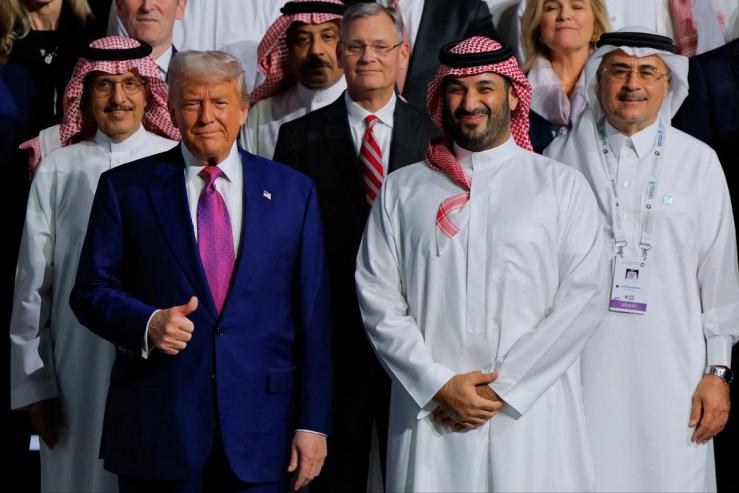When it comes to Middle Eastern diplomacy, rigid ideological thinking tends to undermine American interests. US President Donald Trump’s tour of Gulf capitals last month signaled that abstractions would no longer control the American approach to the region. Practical partnerships would.
This was evident in 2017, when Trump said in Riyadh that he wasn’t there to “to lecture” nor “to tell other people how to live.” While that speech was dominated by security imperatives, which was necessary at the time, the Trump Doctrine in the Middle East evolved from a recognition that America’s interests are best served when its partners in the region thrive economically.
In Riyadh last month, Trump praised Gulf leaders for “forging a future where the Middle East is defined by commerce, not chaos.” Emphasizing his duty to “defend America and to promote the fundamental interest of stability, prosperity, and peace,” he signaled a departure of US diplomats’ insistence that we couldn’t foster cooperation between countries until America’s foreign policy addressed “root causes.” These abstract orthodoxies resulted in false choices and stalemates rather than cooperation and progress.
The Trump Doctrine rejects these artificial constraints, and the Gulf is a prime example of the approach. Trump no longer sees the region as security partners, oil suppliers, or cash machines. The president recognizes them as engines of regional prosperity whose success directly benefits American industry.
Gulf countries pledged to invest more than $2 trillion in the US, and if they follow through, it would make Trump the most significant booster of foreign investment into the American economy. The Gulf would benefit as well, reflecting Trump’s fundamental worldview that the best deals improve everyone’s welfare. Prosperity is not finite but grows through smart partnerships.
This pragmatism extends to diplomacy. Previous administrations often assumed that deepening ties with one partner required distancing from another. The Abraham Accords showed that cooperation doesn’t have to be a tradeoff. While Trump expressed his “dream that Saudi Arabia…will soon be joining the Abraham Accords” in Riyadh, his doctrine’s pragmatism requires recognizing reality: “You’ll do it in your own time, and that’s what I want.”
Critics argue that the president’s approach lacks a moral vision. I don’t see it that way. Trump’s repeated refusal to “lecture” is best understood as an appreciation that the rapid social and economic changes in the region have not been easy. The extent of further changes will come if and when the Gulf States are ready. It is wrong — and not in America’s interests — to demand that they become just like us. Trump’s moral choice is to respect Gulf states’ unique history, culture, religion, and society.
“Peace, prosperity and progress ultimately come not from a radical rejection of your heritage,” he said, but “from embracing your national traditions and…heritage that you love so dearly.”
Trump Doctrine pragmatism extends to Iran. In 2017, Trump warned that “until the Iranian regime is willing to be a partner for peace, all nations of conscience must work together to isolate Iran.” Today’s approach, while still harshly critical of Iran, recognizes that Gulf prosperity naturally diminishes Iranian influence while creating space for possible diplomatic solutions. Rather than demanding Arab and Muslim partners choose sides, Trump understands that a prosperous Gulf can engage from strength. If a smart, good deal with Iran can be made, all are better off. If it cannot, all options remain on the table.
What emerged from the Gulf engagement last month is a mature approach tying American flourishing to partners who share Trump’s vision of security, stability, and prosperity. This builds on his 2017 message that “America is prepared to stand with you — in pursuit of shared interests and common security,” but evolves beyond security cooperation to shared prosperity. This is a natural evolution informed by regional changes and American experiences.
For those of us who have spent years watching Middle East policy lurch between overcommitment and neglect, the Trump Doctrine offers something genuinely new: a sustainable framework for American engagement based on shared prosperity rather than shared enemies.
Jason D. Greenblatt was President Donald Trump’s Middle East envoy between 2017 and 2019. He is the author of In the Path of Abraham and the founder of Abraham Venture LLC. Follow him on X: @GreenblattJD

